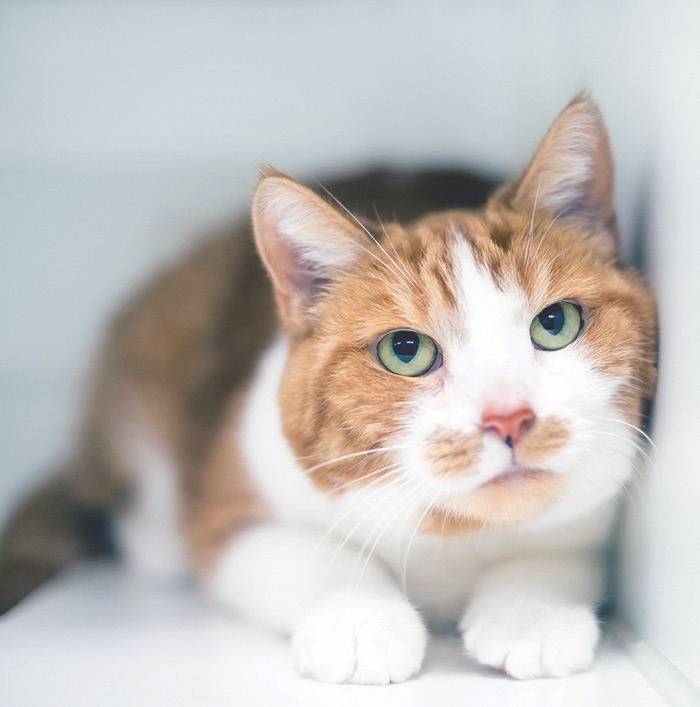Everybody knows that stress and cats is not a good mix. Stressed, anxious cats are no fun. They often urinate and defecate around the house. They attack each other. They attack you. They hide for days at a time. They start pulling their own hair out, and they get sick. It behooves cat owners to do everything they can to manage their cat’s anxiety.
The mainstays of stress management in cats are the avoidance of stressors (when possible), environmental management, behavior modification, and desensitization with guidance from your veterinarian. When these strategies fail, we look to medications.
“Cat owners should not be concerned about using anti-anxiety medication for their kitties when it is warranted,” says Pamela Perry, DVM, PhD, lecturer in the Department of Clinical Sciences, Behavior Resident at Cornell University’s College of Veterinary Medicine. “These medications have been studied and proven safe in cats. In addition, they help reduce the kitty’s anxiety and allow the other treatment recommendations to be more effective. In the long run, anti-anxiety medication can improve a cat’s quality of life.”
For Want of a Pill
Medicating stressed cats, though, can present a conundrum. If you’ve ever tried to give your cat a pill, you get it. It is not for the faint of heart, and it is stressful for all involved parties. So, while the medication may help, the medicating procedure itself most certainly will not, making this potentially a “two steps forward, one step back” situation.
There are a few ways around this. If pilling your cat is impossible, you can sometimes get them to eat the pill in food or a Greenies Pill Pocket. Most medications can now be formulated into flavored liquids or flavored chewables by compounding pharmacies.
You may have heard of transdermal medications for cats that are simply rubbed on the inside of the ear. This option is very appealing to cat owners, but beware! The systemic absorption and bioavailability of many medications administered this way is highly variable. For some medications, research shows it’s downright poor.
Another way to get around the medicating-cats conundrum is to exhaust all your other anti-anxiety options first:
- Feliway: This product contains a compound that mimics the cat’s natural feel-good pheromones that calm them and reduces anxiety. It is tested, tried, and true and can be very helpful in your home. It comes as a spray and a diffuser.
- Zylkene (Vetoquinol): This supplement contains alpha-casozepine (casein), a milk protein shown to promote relaxation and to relieve anxiety in cats. It comes in chewables or capsules that can be opened and fed in food.
- Rescue Remedy (by Bach; Nelson & Co): This product contains five natural flower essences that relieve stress and promote calmness. It can be put in food or water, but it is less well absorbed in food.
- Prescription diets: Royal Canin Calm (contains casein and l-tryptophan, an amino acid that helps with anxiety, sleeplessness, mood disorders) and Hill’s Multi-Care Stress (contains casein)—resulted in improvement in some cases.
If your cat needs help with anxiety beyond these suggestions, it’s time to talk with your veterinarian about medications.
Medications
Anxiety meds for cats fall into two main categories: short-acting drugs for situational anxiety and longer-term meds for ongoing daily stress.
The short-acting meds are mainly used for things like travel, veterinary visits, grooming appointments, boarding, and intermittent stressful home events like parties. Most of these will take effect within one to two hours and last four to 12 hours. The most common medications prescribed in this way are trazodone, gabapentin, and the benzodiazepines alprazolam, lorazepam, and clonazepam. It’s always a good idea to test the prescribed dose prior to when you really need it to make sure it will have the desired effect. If it doesn’t, talk to your veterinarian about adjusting the dose.
Important note: Diazepam (Valium), a well-known benzodiazepine, is typically not prescribed for cats as it has the potential to cause unpredictable severe liver necrosis (tissue death). Since there are plenty of other choices, it doesn’t make sense to risk this life-threatening complication.
Medications prescribed for ongoing stress at home are typically either tricyclic antidepressants (TCAs) or selective serotonin reuptake inhibitors (SSRIs). These medications typically take four to six weeks to fully kick in. When they are no longer needed, they should always be tapered down, never discontinued abruptly.
The most commonly prescribed TCAs are clomipramine and amitriptyline. The most commonly prescribed SSRI in cats is fluoxetine (Prozac). Paroxetine and sertraline are alternative SSRIs.
For stress-induced aggression and urine spraying, buspirone (an azaperone) is sometimes prescribed.
None of these prescription medications are FDA-approved for use in cats. As such, their use in cats is considered extra-label or off-label. Extra-label means that the medication is being used in a way that is different from how it’s been approved. While this may sound like a bad thing to you, it is an accepted, common practice in veterinary medicine.
Bottom Line
We encourage you to try the non-medical suggestions mentioned above for your anxious cat. But, if all else fails, talk to your veterinarian about the pros and cons of medicating your cat. Sometimes it can be the difference between a stressed out, anxious pet and a happy, relaxed companion.




